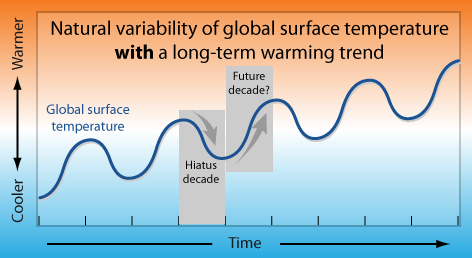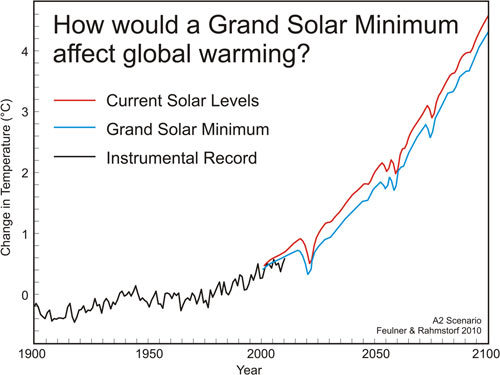Sorting out Settled Science from Remaining Uncertainties
Posted on 1 November 2011 by dana1981
 Much ado is made about the phrase "the science is settled," but to what does the phrase refer? There are certainly a number of climate issues for which the scientific evidence is so conclusive and robust, they can reasonably be called "settled." For example, the fact that the increase in atmospheric CO2 levels is due to human emissions, the fact that the planet is warming (as confirmed once again by the BEST study), and the fact that the increase in CO2 is responsible for a substantial fraction of that warming.
Much ado is made about the phrase "the science is settled," but to what does the phrase refer? There are certainly a number of climate issues for which the scientific evidence is so conclusive and robust, they can reasonably be called "settled." For example, the fact that the increase in atmospheric CO2 levels is due to human emissions, the fact that the planet is warming (as confirmed once again by the BEST study), and the fact that the increase in CO2 is responsible for a substantial fraction of that warming.

New Scientist has published a useful resource on this subject, discussing climate knowns and unknowns.
Fake Skeptics vs. Real Science
Of course, the climate "skeptics" who want to delay and prevent action to address global warming love to argue that "the science is NOT solved." And of course it will always be possible to make that argument, because there will always be aspects of the climate system which we don't fully understand, as is the case for every field of science. For example, we know that there is a global energy imbalance, with more incoming than outgoing energy due to the increased greenhouse effect, which is the underlying cause behind global warming. However, it's difficult to precisely determine that energy imbalance using either satellites or measurements on Earth.
Over the past decade, the warming of global surface temperatures has slowed down. Studies have shown that climate model runs do predict that there will be periods on the order of a decade during which we expect to see this slowed rate of warming, even though the underlying man-made global warming signal remains in place (i.e. Santer et al. 2011):
"Because of the pronounced effect of interannual noise on decadal trends, a multi-model ensemble of anthropogenically-forced simulations displays many 10-year periods with little warming."
If climate models were perfect, they could anticipate these short-term periods of little surface warming. However, there are many different effects which can cause short-term temperature changes. There are also important parts of the climate which we don't yet have good measurements for, such as the amount of heat in the deep oceans, and the amount of aerosols in the atmosphere. Because climate scientists had a difficult time explaining the short-term slowing of the surface warming trend over the past decade, Kevin Trenberth infamously said (in a stolen email),
"The fact is that we can't account for the lack of warming at the moment and it is a travesty that we can't."
There have been a number of recent studies attempting to address this short-term slowed surface warming, which were nicely summarized in this article by Paul Voosen, which quotes a number of different climate scientists who are studying the issue. Unfortunately, certain climate "skeptics" have grossly misrepresented these scientists, depicting them in a mocking caricature, and claiming that in trying to determine the cause of the slowed surface warming, they are just making "excuses." Such is the state of the climate denial community, that they equate scientific research with making excuses.
Many Causes
But back to the science and the causes of the slowed surface warming. As Susan Solomon put it,
"There is no silver bullet. In this case, it's four pieces or five pieces of silver buckshot."
Skeptical Science has discussed many of these contributors to the short-term slowed surface warming. For example, some heat has been temporarily transferred to the deeper ocean layers, as Meehl et al. (2011) demonstrate (Figure 1).

Figure 1: Diagram illustrating "natural variability" with a long-term warming trend.
Additionally, increased human aerosol emissions (primarily from Chinese coal combustion), and more frequent La Niña events over the past decade have had a short-term cooling effect, as Kaufmann et al. (2011) found. A decrease in stratospheric water vapor may have added another short-term cooling effect, as Solomon et al. (2010) concluded, and relatively small volcanic eruptions may be having a larger cooling effect than expected as well, as Vernier et al. (2011) suggest. On top of all that, we just experienced an unusually long minimum in the 11-year solar cycle.
Despite Short-Term Uncertainty, Long-Term Warming Continues
In short, it appears that nearly every significant short-term effect on the global surface temperature was in the cooling direction over the past decade. However, significant uncertainty remains regarding how large of a role each effect played in the short-term slowing of the increase in global surface temperature.
Kevin Trenberth believes the warming of the deep oceans was a major contributor. James Hansen, on the other hand, believes that the increase in atmospheric aerosols can explain most of the offset, and that based on recent research, that the ocean doesn't mix heat into its deep layers as well as climate scientists thought.
If Hansen is right, there is a smaller global energy imbalance, which means less heat "in the pipeline" (less warming that we will experience after we stop increasing atmospheric CO2). However, it also means that aerosols are offsetting more greenhouse gas warming than we previously thought, so as our air becomes cleaner, it will reveal more previously-hidden warming, as discussed in Hansen et al. (2011).
This means that although climate scientists still can't perfectly explain the temporarily-slowed warming of surface temperatures, they know that regardless of the explanation, there is much more global warming left in store. We know this because of the settled science discussed above. We are increasing the amount of CO2 in the atmosphere, and through the greenhouse effect, that increased CO2 will continue to warm the planet.
The short-term effects can only temporarily dampen (or amplify) that long-term man-made global warming trend. For example, aerosols only remain in the atmosphere for a year or two before they're washed out, so the aerosol cooling effect can only continue to offset greenhouse gas warming if we continue to pump more and more aerosols into the atmosphere. However, because they have adverse impacts on human and environmental health (i.e. see the air in China, literally), most countries are trying to reduce their aerosol emissions (including China). El Niño and La Niña are cycles which cancel each other out over the long-term. And while we can't predict how solar activity would change, a solar minimum as big as the largest in the past several centuries would only offset 7 years' worth of man-made warming (Figure 2).

Figure 2: Global mean temperature anomalies 1900 to 2100 relative to the period 1961 to 1990 for the business as usual scenario. The red line represents temperature change for current solar levels, the blue line represents temperature change at Maunder Minimum levels. Observed temperatures from NASA GISS until 2010 are also shown (black line) (Feulner 2010).
The Climate Casino
We can think of the climate like a casino. Any given gamble is unpredictable, and you may very well take money from the casino in a given bet or after a given day's worth of gambling. But the odds are stacked in the casino's favor, so it is certain to make money on average from all the bets that are placed. The longer the timeframe and the more bets that are placed, the more certain the casino can be that it will make money from the gamblers.
Likewise, over short timeframes, global temperature changes can be difficult to predict. However, over the long-run, the underlying man-made global warming trend will dominate as all of those short-term effects average out. Right now the gamblers are on a lucky streak, but it simply cannot last indefinitely. The casino will aways win out in the end, as will the long-term man-made global warming signal.
And in keeping with the casino analogy, by continuing to pump more and more greenhouse gases into the atmosphere, we are all taking a very big gamble with the future of the global climate, and thus with the future of the human race.































 Arguments
Arguments






























[DB] Thanks for the questions!
1. The latter (there are just so many denialist articles online). But I note that the volume of neutral or pro-ACC scientific papers dwarf those anti-ACC articles appearing in the scientific literature.
2A. There are indeed relatively few articles dealing specifically with the tropics on SkS relative to those dealing with other regions, such as the poles. The biggest reason for that is the ACC effects initially are being realized in the polar regions due to polar amplification effects. It is those amplification effects that are causing regional warming (initially mostly in the Arctic) which are causing changes which will be felt globally. Hence the focus on those areas.
2B. Many non-global articles that focus on the US or Australia do so to counter the sheer volume of denier articles coming from, and based on, those areas.
HTH.
[DB] "Too many scientists have yet to embrace AGW to consider the science to be settled."
As in more than 2-3? You must cite specifics with links to sources to back up your assertions.
[DB] Quite frankly, everything you've written is known to be incorrect (it's a style called Gish Gallop). You could find it all out for yourself, if you wanted to, simply by using the Search function in the upper left of every page here. Ranging from the Oregon Petition, Inhofe's list, just about all of the individuals you name, to CO2 oceaninc fluxes, natural vs manmade warmings, attribution forcings (to name but a few stream-of-conscious denialist memes), all have been looked into here at Skeptical Science.
I, for one, find it curious that some continually aver things to be "natural" in origin without having taken the time to actually get a handle on the science for themselves. And this especially applies to those who have been commenting here for as long (over a year and-a-half) as you have. That's the $64,000 question.
No one says understanding a multi-disciplinary field like climate science would be easy. It's not, if you want to get a good grip on the details. But the details are all readily available, for those interested in learning.
short-term internal variabilityto me. Of course, tamino did this with greater sophistication last year. Has anyone in deniersville produced a graph like this showing that internal variability swamps the trend or are we supposed to just take their word for it?